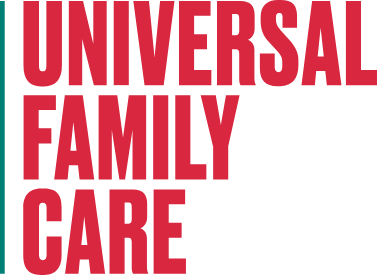“My mom has been dying since I was a young boy, but now she is living. It’s home care that’s made all the difference.”
WHAT IS UNIVERSAL FAMILY CARE?
A public family care insurance fund to make care affordable and accessible to all
We’ve been taught that families take care of their own. And yet — as more people live longer, working millennials become parents, fewer households can rely on stay-at-home caregivers, and the meaning of family evolves — providing care has become too unmanageable for many to handle alone.
Imagine if it were manageable. If new parents could draw on a public family care insurance fund to take paid leave to bond with their new babies and then use it pay for trusted daycare so that they can return to work. If relatives of an aging loved one could tap into that same fund to hire a home care worker so they don’t have to quit their jobs and move cross-country to provide care. If a worker could take their benefits from job to job and not wonder if taking leave or starting a business would affect their ability to care for family.
That’s the future we’re building with Universal Family Care. It’s visionary yet simple. It covers any care need, for any person, at any stage of life. It weaves together and expands existing public programs and integrates systems so everyone can easily navigate options, keep track of their care, and know they are covered at the moment they need it the most.
“I cared for my grandmother for 8 years, and my mom had a stroke last year. I’m an only child, and I’m scared. But I know I’m not alone. I want to be part of the solution.”
Who Will Need care? Everybody.
Why we demand care
We want to be there for our loved ones when they need support. But there are few affordable options for us to turn to, and families across the country are reaching a breaking point –– financially, emotionally, and physically.
Since care happens inside the home, most people think they’re going it alone. But there are 43.5 million unpaid family caregivers struggling with impossible choices like paying the bills or being there for a loved one. Right now, one in three people in America are in active caregiving relationships – and this number will only grow as our nation’s population ages.
Existing services, designed for one-income families, don’t help much. Programs like Medicare or federal unpaid leave from work often don’t provide what families need — forcing them to pay out-of-pocket. At $50,000 a year for home care and $10,000 a year for childcare, only the richest can afford care, and only the poorest can access it through public programs – leaving families in the middle without help. No wonder people, disproportionately women, are quitting or losing their jobs to provide care — hurting their finances, retirement security, and the economy at large.
We will all need care. It’s time to turn the crumbling, patchwork system we inherited into a strong care infrastructure that can meet the needs of 21st century families.
“Our care system isn’t working, but let’s unite to fix it. The time for the luxury of not doing anything is gone.”
What we can achieve is real.
And We Know How to Get There
Building the strong care infrastructure we need will take federal action and investment. The good news is that advocates and policy experts are already putting key pieces in motion: federal bills are underway for paid family and medical leave and more robust childcare and early education, while support for public long-term services and supports programs is rapidly rising.
The even better news is that states do not have to wait to achieve Universal Family Care: they’re already on their way. Seven states and the District of Columbia have enacted universal paid family and medical leave, Washington State has enacted universal long-term care supports, and several are moving toward affordable child care for all. In 2018, the National Academy of Social Insurance convened a study panel of 29 experts across many care fields to think through best practices for how state-based social insurance programs could be designed in each of these realms of care, as well as how a holistic and integrated approach could be structured.
Designing Universal Family Care: State-Based Social Insurance Programs for Early Child Care and Education, Paid Family and Medical Leave, and Long-Term Services and Supports presents policy options for program design, funding and implementation. You can read the full report here, and if you are interested in learning more or bringing a deeper conversation to your state, please email info@caringacross.org.
